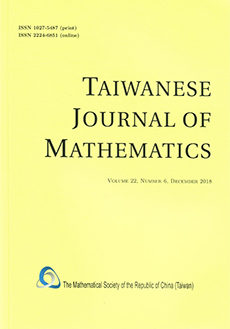Abstract
In the western world there is this myth that the ancient Chinese knew a special case of Fermat's Little Theorem and erroneously took it as a criterion for primality, namely, that $n$ is a prime if and only if $2^{n-]} -1$ is divisible by $n$. This article discusses how this myth might have come about, in particular tells the story of an investigation on number theory by Li Shanlan in the mid $19^{\rm th}$ century. The discussion touches upon the social history of the incident in connection with the polarized attitude different foreigners took towards Chinese mathematics at the time.
Citation
Qi Han. Man-Keung Siu. "ON THE MYTH OF AN ANCIENT CHINESE THEOREM ABOUT PRIMALITY." Taiwanese J. Math. 12 (4) 941 - 949, 2008. https://doi.org/10.11650/twjm/1500404988
Information





